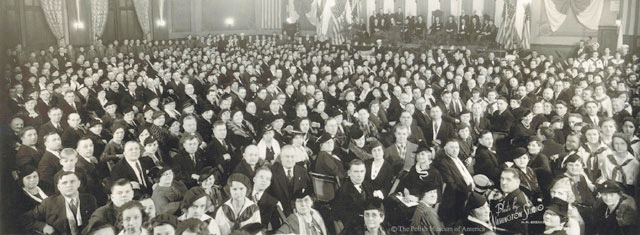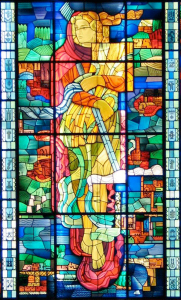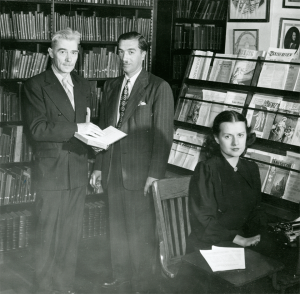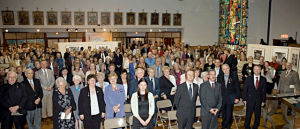Our history
About PMA
The Polish Museum of America was established in 1935 as the “Museum and Archives of the Polish Roman Catholic Union of America.” The first public display area opened on January 12, 1937 in a specially designed and constructed room within the headquarters building of the PRCUA. From that date the Museum’s collection and importance grew very rapidly and quickly gained autonomous status as “The Polish Museum of America” with its own governing board of directors.

Polish Museum of America opening in 1937. (Photo by Władysław Różański)
There were two events that caused the rapid expansion of the Museum’s collections. The first originated from the 1939 World’s Fair in New York City, New York. The year 1939 marked the 20th anniversary of the Second Republic of Poland and the government of Poland marked that anniversary with a large exhibition at that World’s Fair.

The stained glass window titled, “Poland Reborn” is one of objects acquired by the Museum from the 1939 World’s Fair. It is currently on permanent display at in the Sabina P. Logisz Great Hall.
Unfortunately, in September of 1939 Poland was invaded and war had gripped Europe. At the close of the World’s Fair, it became clear that the Polish exhibits could not return to Poland and their disposition was uncertain. In order to preserve at least a portion of the exhibits the directors of the Museum determined to purchase from the government of Poland nearly three fourths of the exhibits. Display of these exhibits required a very significant expansion of the Museum’s public display areas into the 3rd and 4th floor auditorium facilities of the PRCUA headquarters building. In June of 1941 this expanded display area opened to the public. Thus, the Museum was able to preserve a very significant collection of art from the Polish inter-war period, 1919 to 1939, as well as significant Polish historical items.
The second significant event was the donation to the Museum of the personal possessions of Ignacy Jan Paderewski following his death in June 1941. Both Ignacy Paderewski and his sister, Antonina Paderewska Wilkonska, were enthusiastic supporters and generous sponsors of the Museum. Antonina, executor of Ignacy’s will, decided to donate these personal possessions to the Museum. In addition, the management of the Buckingham Hotel in New York City, where Ignacy spent the last months of his life, allowed Antonina to obtain the furnishings from the suite of rooms he had occupied. These furnishings were also donated to the Museum. With the assistance of Ignacy’s personal secretary, the furnishings and his personal mementos were arranged for public display in the room that had been the first display room of the Museum in 1937. This revised space was officially re-opened with a special dedication ceremony on November 3, 1941. Today this collection remains in the original space, but has been remodeled to become one of the Museum's most memorable and fascinating exhibit spaces.
During those first few years of operations the Archival collections also grew substantially through very aggressive acquisition policies. Under the direction of Mieczyslaw Haiman, a large collection of books and pamphlets about Poland and by Polish authors was collected. Later, this collection was catalogued into “Polonica Americana” and “Polonica in English.” Complete collections of Polish-language newspapers, religious records, photographs and maps were also acquired.
The maps, mostly of Eastern Europe, turned out to have some significance. It seems that the Archives had the only detailed maps of the area outside of German occupied Europe. The visitor’s logbook records, without other comment, that on May 7, 1943 twenty employees of U.S. Navy Intelligence Service spent some time in the Museum’s facilities. There are no further entries in the logbook after that entry on May 7 until May 17, 1943. During those ten days all our maps were microfilmed. At the end, the Museum was given two steel storage cases to properly store the maps in a flat configuration. The cabinets still have the labels "U.S. Naval Intelligence" on them.
During the succeeding decades, the Museum has continued to acquire many books, other publications and other artifacts as well as a great deal of works of art. The Museum has, from its beginning, and still does benefit from the generous support and sponsorship of the Polish Roman Catholic Union of America.
Today, the Museum is a recognized resource for materials pertaining to Poland and the Polish-American community. Managing this eclectic collection is a very challenging and complex task. Only a relatively small portion of the Museum’s assets are on display at any given time. The remainder must be preserved and stored in ways that allow for convenient reference and future research. The Museum is determined to continue its mission to Polish and Polish-American past for the benefit, instruction and education of current and future generations.
We are open:
Tuesdays, Thursdays, Saturdays, and Sundays from 11 am to 4 pm
Recent Posts
- 46. Konferencja Muzeów, Archiwów i Bibliotek Polskich na Zachodzie w Muzeum Polskim w Ameryce
- Commemorating the 40th Anniversary of Father Jerzy Popiełuszko’s Death
- Welcoming a Distinguished Delegation from the Ministry of Foreign Affairs at the PMA
- XLVI Conference of Polish Museums, Archives and Libraries in the West Concludes at the Polish Museum of America
- The 46th Standing Conference of Museums, Archives, and Libraries (MAB): Day 4
- The 46th Standing Conference of Museums, Archives, and Libraries (MAB): Day 3
- The 46th Standing Conference of Museums, Archives, and Libraries (MAB): Day 2
- The 46th Standing Conference of Museums, Archives, and Libraries (MAB): Day 1
- 46. Sesja Stałej Konferencji MABPZ
- Commemorating Witkacy: A Visionary of 20th Century Polish Art
Our Team
-

-

-

Teresa Sromek
Administrator / Archivist -

-

-




Comments(11)
Dina Padilla says:
April 8, 2017 at 11:01 amThe Preservation of this museum is a must because it is also represents the history of the New Poland that started in the Polish Downtown area, Division, Ashland, and Milwaukee Triangle way back in the 1800’s. AND it should be a landmark of what the Polish people were about. their rich history that greatly influences the city of Chicago till this day and for much of what is does represent being a high culture and Catholic community,. My ancestors came to this neighborhood around the last of the 19th century and my roots are in that neighborhood and I just cannot imagine that this building would be torn down like so many others in this neighborhood, all for rich global investors who not only have no ties to this history or even the city but who are only in on the great gentrification of this neighborhood for top marker investments.
Chris Reader says:
February 20, 2023 at 10:23 pmJust curious to know if you have any works by Szukalski?
Dariusz Lachowski says:
February 21, 2023 at 7:04 amCertainly, we do possess works by Mr. Szukalski in our collection. We would like to extend a cordial invitation to you to view a film that is exclusively dedicated to Mr. Szukalski and his works that we have in our possession. Video: https://youtu.be/n3rPvx6m2vk For more information, please contact our curator at: julita-siegel@polishmuseumofamerica.org
Marek says:
October 31, 2023 at 8:41 amDzień dobry. Obejrzałem wspaniały film. Nigdy wcześniej nie słyszałem o tym artyście .Mieszkam w Polsce w mjsc Zduńska Wola, kilkadziesiąt km od Warty. Byłem wielokrotnie w tym miasteczku. Film i historia tego wielkiego rzeźbiarza zainspirowała mnie do poszukiwań śladów rodziny Szukalskich mieszkających przed wojną w Warcie. To przepiękna okolica. Polska przyroda, wieś i tradycje ludowe są niepowtarzalne i do dziś dzień szeroko przekazywane z pokolenia na pokolenie. Tradycje te najwyraźniej są widoczne podczas corocznych świąt katolickich (Boże Narodzenie, Wielkanoc, Boże Ciało..). W obrazach ,w pieśniach ale także widzę w rzeźbie przekazywane i kultywowane jest piękno przyrody i ludzkiego ciała – stworzonego na obraz Stwórcy. Pozdrawiam wszystkich pracowników muzeum oraz zainteresowanych tradycją i historią Polski. W dniu jutrzejszym przypada Dzień Wszystkich Świętych i nasuwa mi się pytanie czy istnieją jakieś sakralne ślady twórczości mistrza ,a może nagrobki na parafialnym cmentarzu artysty w Warcie. Czy w Polsce organizowane są wystawy tego twórcy? Niestety w najbliższym czasie nie będzie mnie stać na podróż do USA aby zobaczyć te dzieła. Proszę uprzejmie o informację. Marek
Elaine McDevitt says:
March 15, 2023 at 5:11 pmI am curious about your collection from Jana Soltysiak. My great great grandfather was Jana Soltysiak and I am curious if this collection is his. He was born 1857 and was killed in 1900. Thank you
Elaine
Dariusz Lachowski says:
May 30, 2023 at 7:50 pmTo uncover the answers to your suspicions, I suggest you visit us. It’s the most effective way to gather the information you seek.
Debra Paull says:
May 30, 2023 at 7:38 pmI was told some things of my uncle Lt. Col. Rev. John Jedlowski ( from WWI) are in the museum . How would I find out?
Probably paying a visit!!! ?
Dariusz Lachowski says:
May 30, 2023 at 7:48 pmI highly recommend visiting us to get a firsthand experience of our collections. It’s the ideal way to familiarize yourself with what we have to offer!
terese pawletko says:
June 14, 2024 at 6:40 pmMy grandfather and great uncles were part of haller’s army. How do i get documents from the haller’s army registry for marcin, antoni and teofil krysiak? Djienkuje bardzo
Leroy Glonke says:
August 1, 2024 at 11:22 amI am seeking information regarding contributions of Polish Historical items to the museum.
But first, a thumb nail personal history.
I am of Polish decent. I live on the border of N. Illinois and S. Wisconsin. My Grandparents came to the USA just prior to WW-1 (1914-1918) and took up residents in Chicago. I have been collecting Polish military & civil Orders, medals and awards for a number of years and now, at age 94, I have made the decision to give my collection to a museum where the may be enjoyed by all who view them.
However, I need assurance that they will never end up in someone’s private collection and will always remain museum property and will be displayed for public view and not locked away in some basement archive.
I will be happy to show my collection to a museum representative (by appointment only) Please call 1-847-336-1028 leave a message and a contact name and number and I will get back to you ASAP
Leroy Glonke says:
August 1, 2024 at 11:40 amI have a sizeable collection of Historic Polish military & civil medals and badges that I would like to donate to the museum. Key word here is DONATE
Please contact me at 1 (847) 336-1028 for further information and to make an appointment for you to view the items. I live in Beach Park, Illinois ( just outside of Waukegan) Leave a message with your contact information and I will get back to you ASAP.